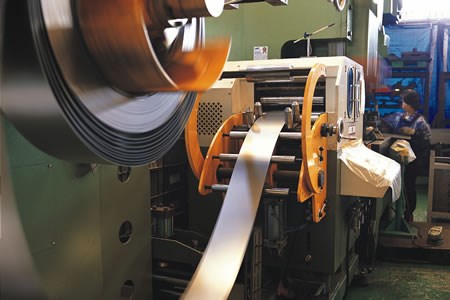What started out as a time of plenty for Northern Ontario’s manufacturing sector has all too rapidly turned into a bittersweet year as the waves of the global economic crises begin to washing over the region.
The year 2008 allowed for great success at Atlas Copco, which has grown rapidly and expanded its line of service offerings.
This summer, the company doubled its North Bay exploration products site, moving from a 4,000-square-metre space to a newly constructed 9,000-square-metre facility, which includes a new line of Swellex rock reinforcement bolts.
However, the global economic downturn has imposed sudden change which has left many scrambling, including Atlas Copco.
According to Jeff Hagar, general manager of its North Bay operations, its order book has seen a “quite significant” number of cancellations.
Its clients now have tremendous difficulty accessing cash. This has caused its orders to be cut in half in recent weeks.
“Our clients don’t have cash, and they just can’t get it,” he says.
“This is causing exploration spending to be cut, which is obviously going to affect us.”
Of its local 110-person workforce, the company recently issued lay-off notices to 37 people in recent weeks, representing a third of its local staff.
This mirrors actions recently taken by other Northern firms.
Boart Longyear has trimmed 45 jobs, while explosives company Dyno Nobel has cut 18 jobs since the beginning of 2008.
This approach is an unfortunate, but necessary step to weather the storm, says Hagar, though programs have been put into place to assist those laid off to find other work, as well as counselling.
“We can’t employ people and build inventories because we’re nice guys, because that’ll kill us in the long run. So we have to make some very unpleasant business decisions, but we’re trying to do them in a responsible and professional way.”
The sudden belt-tightening seen in the Northern mining sector has also left some concerns with the more than 90 businesses which make up the Sudbury Area Mining Supply and Service Association (SAMSSA).
Dick DeStefano, SAMSSA’s executive director, estimates that more than 100 jobs have already been scaled back in recent weeks, with another 100 expected to be lost by early December.
He anticipates that if the financial crisis is not tempered by April 2009, it’s likely that one out of every five employees may be laid off or put on hold. This translates roughly to 3,000 less people on the job by the end of the fiscal year.
However, Destefano is quick to point out that although it’s no small number, there would still remain 12,000 of the original 15,000 supply and service workforce.
“We’re getting a mixed response, but the anticipation is that it’s going to be a tough time. There will be more layoffs, and my guess is that the 200 jobs lost will escalate, but there will still be about 80 or 85 per cent workforce operating.”
Despite the concern, however, DeStefano insists that many Northern long-time manufacturers have seen worse times and have the ability and knowledge to survive.
One such example of the hardiness can be seen with Dave Rector, whose family business, Rector Machine Works Ltd., has also seen some challenges in recent months.
Having been founded in Espanola in 1937 by Rector’s grandfather, the steel product fabrication and service company has since moved to Sault Ste. Marie and has passed from son to son, with Dave about to take the helm.
The company has seen countless challenges throughout its more than 70 years. When faced with challenges in the steel industry. Rector Machine Works turned its eye to forestry industry clients such as St. Marys Paper, and the mining industry. It now exports to Northern destinations such as North Bay, Sudbury and Timmins, as well as throughout the United States.
To try and mitigate the new round of concerns seen in the mining sector, Rector has made a growing effort to diversify even further by reaching out for new partnerships in the North and abroad.
“We have 40 guys working for us, but to us, it’s not 40 guys, it’s 40 families,” says Rector. “So we have to do whatever we can to keep them working.”
Regardless of the current economic turmoil, however, some argue that the long-term view will be positive, and that strategic thinking is all that’s needed to survive in the short-term.
“The mining industry will be around for a long time to come, and so will Atlas Copco,” says Hagar. “We’ve made investments in new facilities, production equipment, and innovations that we remain confident in, and those investments were not made for what’s going to happen in the next three or four months, but what’s going to happen in the coming years.”




